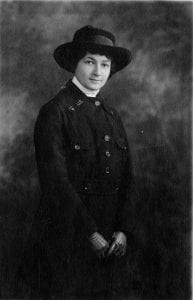

Helen Bulovsky, a WWI Army Corps Nurse from Madison, tended the wounded behind the front lines in France.
Most people who have studied World War I history are aware of the horrors endured and sacrifices made by our service members. Often, when we think of our citizens in military service, images of the Doughboys come to mind. Just as our government called men to military service, women also served during World War I, but with one glaring difference; they did not have the right to vote. Women were called to serve and did so willingly, and yet they were not allowed to fully participate in the government asking for their sacrifice.
The military service of women overseas and at home, and those of women who assumed traditional male roles in factories and farms, forever changed how women thought about their societal roles and what full citizenship meant. Women leveraged these experiences to negotiate full citizenship in the context of women's suffrage. If women were good enough for war, were they not good enough to vote?
In the video below, The Wisconsin Veterans Museum is pleased to share further how women in service during WWI fueled the final push for a woman’s right to vote.

